Customer relationship management (CRM) is the backbone of a successful business, but it’s often hindered by manual CRM methods — like physical folders for every client or an in-house CRM system where every user fends for themselves. Online CRM systems — which are typically cloud-based — have revolutionized the way sales, marketing, and support teams work.
In this article, we’ll explain what a cloud CRM is, why dynamic online CRM platforms like monday.com add value, and what to look for when choosing a CRM for your team.
What is an online CRM?
Customer Relationship Management (CRM) refers to the processes involved in connecting with existing customers and building relationships with new ones.
Essentially, CRM involves:
- Keeping your current customers happy
- Providing customer support when it’s needed
- Actively trying to add new customers
Some companies still rely on on-site CRM with in-house servers maintained by their IT team to carry out CRM activities. If you’re using manual CRM methods in 2022, you’re not unlocking the true potential of CRM. That’s why most businesses these days opt for online customer relationship management software. In fact, taking your CRM online is so common that the term CRM is now used interchangeably with CRM software.
Online, cloud-based software has features that make it easy to navigate and automate customer relationships throughout the entire customer lifecycle.
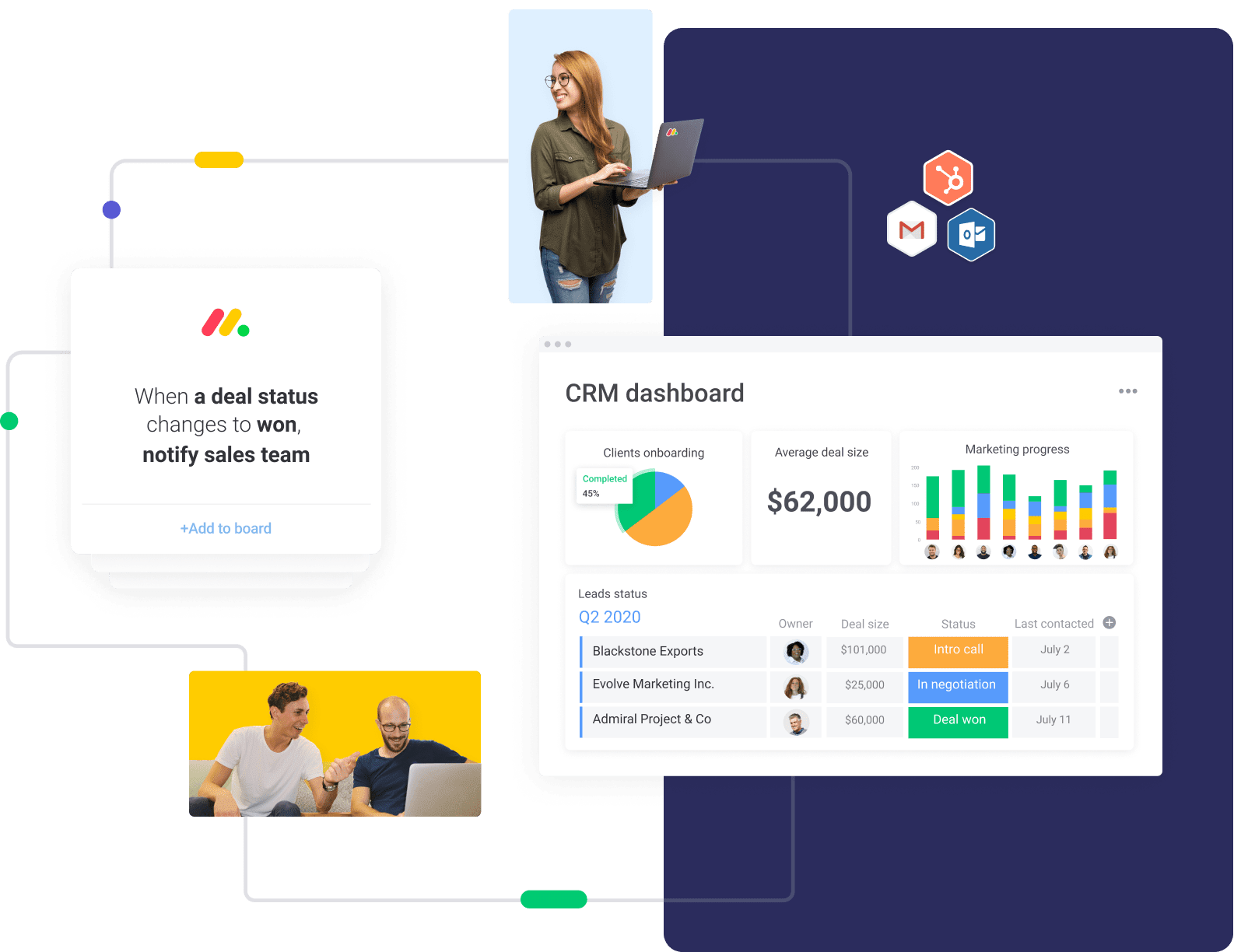
They primarily help you with lead management and sales pipeline management but have additional features for managers to track marketing campaigns, customer projects, and a lot more. In an ever-changing workspace, where 65% of respondents want to become full-time remote employees, cloud-based online CRMs have become the norm.
9 reasons to invest in an online CRM
A cloud-based online CRM trumps an on-site CRM in many vital areas. Let’s explore a few below.
1. Enables efficient remote working
As we said earlier, remote teams are the way of the future. In a 2020 survey of 669 CEOs, 78% agreed that remote collaboration is here to stay for the long term. Whether your sales, marketing, and customer support teams are based in the same city or from different parts of the world, an online CRM can create a collaborative workspace for them to thrive in.
On-site CRM, on the other hand, is tough to implement for remote teams.
2. Centralized data storage
A cloud-based CRM like monday.com stores all your data in one place. This includes customer information, sales deals, marketing campaigns, etc. Everything you need is right there. Managers or team leads can then provide access permissions for appropriate team members.
An on-site CRM might be hosted in one location, but its data tends to be scattered depending on the users and their job roles. Endless email chains for cross-team collaboration are unwelcome but also unavoidable.
3. Easier to update customer data
With an in-person CRM, customer data is spread across multiple spreadsheets and folders. Sales and customer support reps have to go digging to find relevant information, which wastes precious time and leads to disgruntled customers.
CRM software has no such issues since all customer and sales data is accessible to the right people, any time, anywhere.
4. No in-house server maintenance or updates
With an online CRM, you don’t need to hire IT professionals to handle the backend.
CRM vendors are in charge of server maintenance and platform updates. If there’s an issue with the app or software, you can get it fixed ASAP by contacting customer support. Some platforms, like monday.com, even offer 24/7 support.
5. Scalability
Online CRM grows with your company. The size and number of your sales and project boards might increase, but you can handle everything with just a few clicks.
On-site CRM scaling often involves installing new servers and hiring more people to maintain them.
6. Variety of payment options
Most online CRM providers offer both monthly and annual plans, often with a free trial period. This is great for both budgeting and software adoption.
Businesses don’t have to splurge to see if certain software is the right tool for them. They can simply try it out for a month or 2 and cancel their subscription if they don’t like the experience.
7. Integration
On-site CRM involves having a CRM tool that your team has to juggle alongside all their other apps and platforms.
monday.com is one of many cloud-based CRMs that offer 100s of integrations with other apps and tools, so your entire workflow is managed in a single dynamic workspace.
8. Mobile CRM
Your sales reps don’t need to be at their desk to complete deals with a mobile CRM. Online CRM vendors have apps that support desktops, phones, and tablets.
If a sales rep gets a customer call while on the go, they can simply use their Android or iOS app to access real-time information quickly.
9. Provide better customer experiences
All the benefits listed above make it easier for your marketing, customer support, and sales teams to address customer needs more efficiently and provide fulfilling customer experiences. Sign up for a free, no credit required 2-week trial with monday.com to see how.
What to look for in an online CRM
When you want to invest in an online CRM, here are 8 crucial features to look for.
1. Quick setup
Your sales and marketing teams shouldn’t be spending hours and hours trying to adapt to new, puzzling software. monday.com is built to help teams hit the ground running with templates that match all your CRM needs.
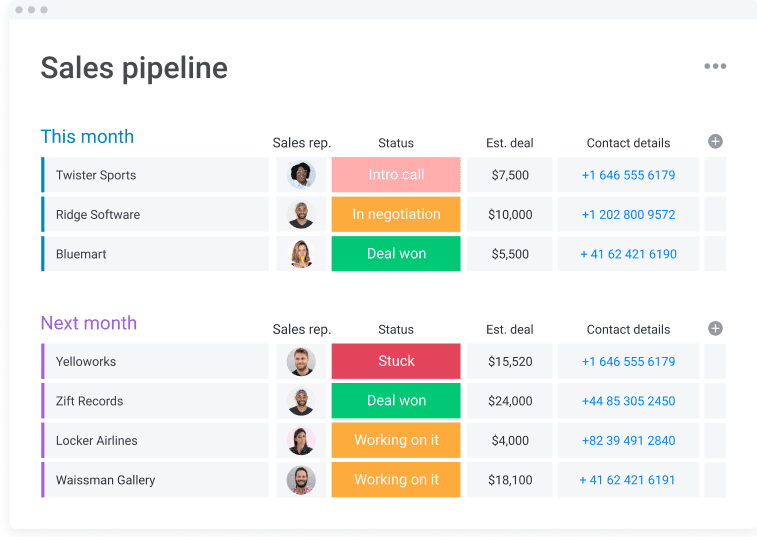
Our templates aren’t just basic to-do lists with labels. They’re intuitive boards with pre-built filters and customizable columns to add different types of data. Essentially, you can pick a template to visualize your entire sales pipeline in a few minutes and then get back to managing leads and customers.
2. Centralized data
When all the data about leads, existing customers, sales deals, meeting/call schedules, etc., are available in a central workspace, it positively impacts sales, marketing, and support teams.monday.com is an excellent platform for data and pipeline management. All your customer data is centralized and updated in real-time. This level of organization improves functionality and thus, helps sales reps boost customer engagement, helps marketers create productive campaigns, and aids support agents in replacing generic responses with impactful conversations.
3. Automation
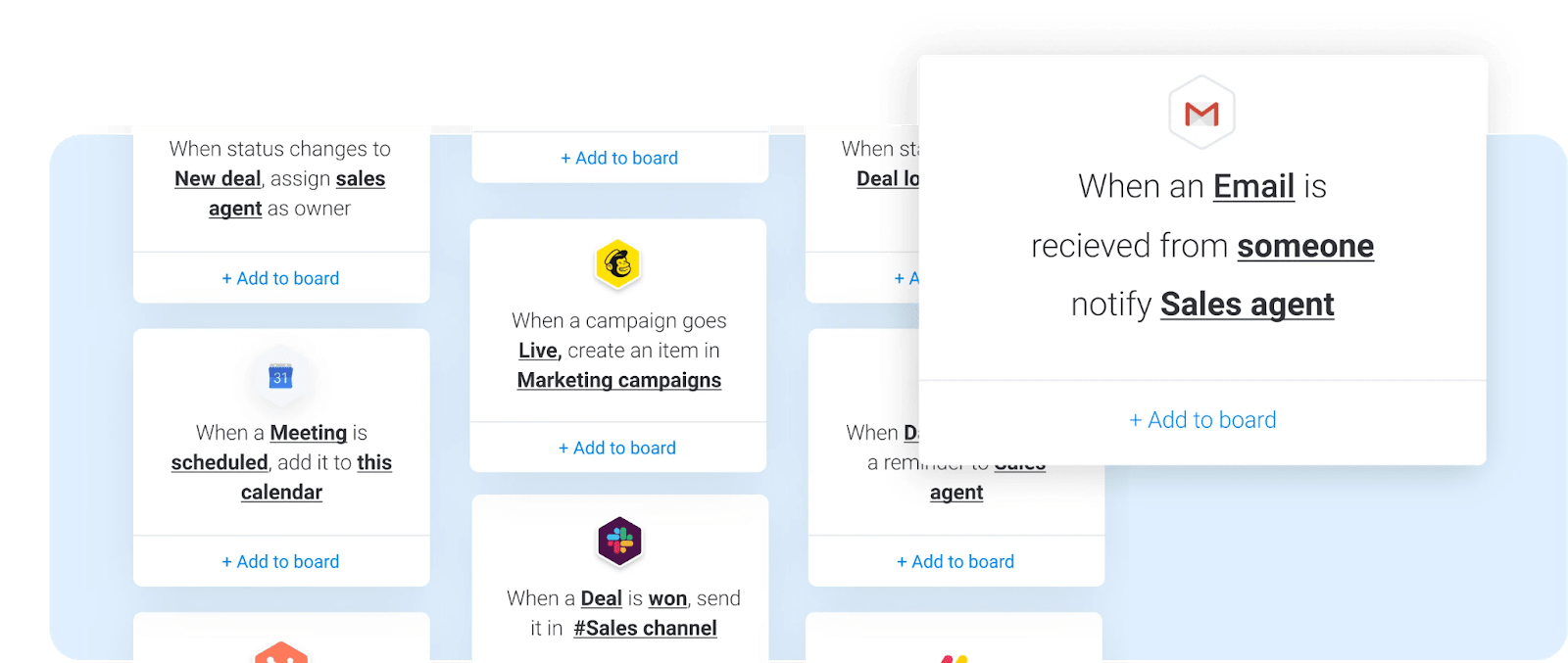
A CRM platform that doesn’t automate repetitive tasks within your sales pipeline is ineffective.
monday.com lets you create custom automation rules throughout your entire workflow, not just your sales pipeline. Your team can forget about mundane tasks and focus on work that matters. No more moving items manually from field to field or sending manual emails. Set up a simple “if X (trigger), then Y (action)” automation and let monday.com do it for you.
For example, you can set up an automation that notifies specific sales reps when their customers send an email.
4. Improved collaboration
A CRM board where all relevant information can be accessed and updated in real-time creates an informed and collaborative workspace. Sales teams can eliminate client-related confusion with monday.com’s detailed sales pipelines, where you can add columns to depict lead status, assignees, call schedules, and much more.
This level of simplicity improves team workflow since everyone’s on the same page. A dynamic pipeline/project board also leads to context-based conversations that revolve around project completion and customer satisfaction instead of minuscule internal issues.
With monday.com, you can promote inter-team collaboration using access permissions.
5. Analytics
Analytics are the key to streamlining processes across the company. You never know how different aspects of your workflow will affect results until you analyze them. If you notice a consistent delay in certain customer projects, for example, you can use analytics to figure out why and address the issue.
On a similar note, sales team leaders can use real-time analytics to assess top performers. They could then ask for suggestions or feedback from these performers to improve the entire work process.
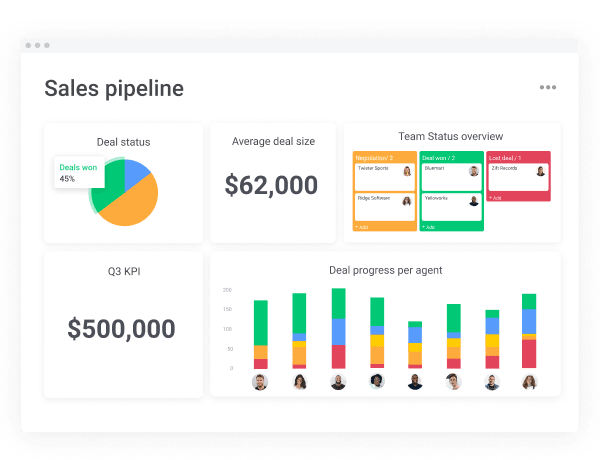
With monday.com, you get access to a dashboard for every project/sales board. It’s a simple matter to add 20+ different widget types to your dashboard to visually represent any statistic or workflow process you want.
6. Integrations
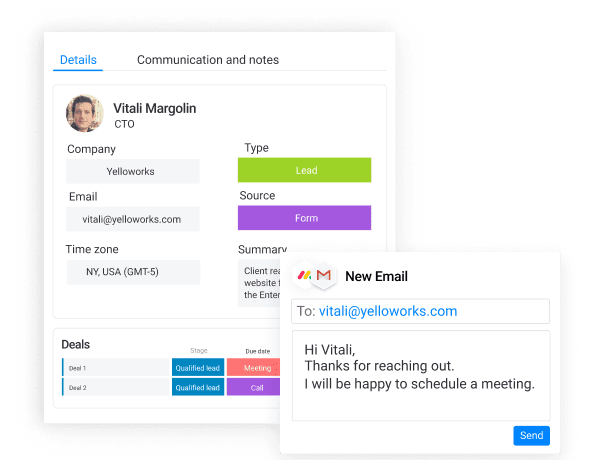
Manual or on-site CRMs are challenging to use because integrating them with existing apps — even essential apps like Slack or Gmail — can be a hassle. monday.com eliminates this problem by enabling third-party CRM integration with all the top communication, file sharing, social media, project management, and process management apps.
You don’t need to switch from one app to another to have a conversation. As the picture above shows, you can do everything in one place.
7. Mobile CRM
In a 2020 survey of 400 salespeople, 41.2% of respondents said that the phone is the most effective sales tool. But a simple phone call won’t do the trick. Your sales reps need to have critical customer information in front of them to have meaningful customer interactions.
This is why mobile CRM is so crucial. Since you can’t expect your sales team to sit by their computers all day or carry laptops around every time they step out, customer data needs to be accessible on every mobile device or tablet.
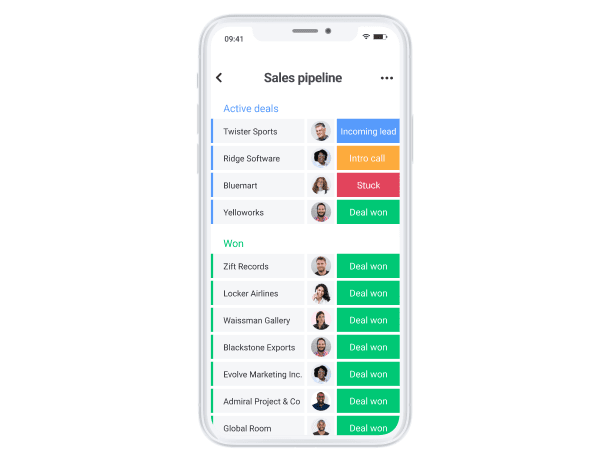
Most advanced CRMs, like monday.com, offer an Android or iOS app for both phones and tablets, in addition to desktop apps. The mobile app must provide the same user experience and functionality as the desktop version.
8. Scalability
No successful company has ever looked at their client list and thought, “Yup, that’s enough. Let’s stop here.” Every organization wants to reach new heights, and you need a CRM application that grows with you.
When you use a platform like monday.com, you can quickly expand your project boards with ease, all with no additional payment and personal assistance from our sales team.
Build your perfect online CRM with monday.com
Whether you’re a start-up looking to grow or an enterprise reaching new heights, monday.com’s CRM is a powerful addition to your software arsenal. We know that every team in an organization is interlinked, so our all-in-one workspace takes you beyond just CRM or project management.

